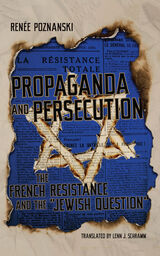5 books about Sharp, Alan
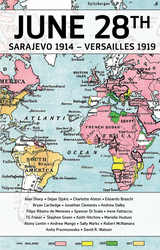
28 June
Sarajevo 1914 - Versailles 1919: The War and Peace That Made the Modern World
Edited by Alan Sharp
Haus Publishing, 2014
On June 28, 1919, the Peace Treaty was signed in the Hall of Mirrors at Versailles, five years to the day after the assassination of Archduke Franz Ferdinand in Sarajevo triggered Europe's precipitous descent into war. This war was the first conflict to be fought on a global scale. By its end in 1918, four empires had collapsed, and their minority populations, which had never before existed as independent entities, were encouraged to seek self-determination and nationhood.
Following on from Haus’s monumental thirty-two Volume series on the signatories of the Versailles peace treaty, The Makers of the Modern World, 28 June looks in greater depth at the smaller nations that are often ignored in general histories, and in doing so seeks to understand the conflict from a global perspective, asking not only how each of the signatories came to join the conflict but also giving an overview of the long-term consequences of their having done so.
Following on from Haus’s monumental thirty-two Volume series on the signatories of the Versailles peace treaty, The Makers of the Modern World, 28 June looks in greater depth at the smaller nations that are often ignored in general histories, and in doing so seeks to understand the conflict from a global perspective, asking not only how each of the signatories came to join the conflict but also giving an overview of the long-term consequences of their having done so.
[more]
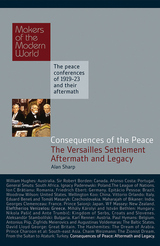
Consequences of Peace
The Versailles Settlement - Aftermath and Legacy
Alan Sharp
Haus Publishing, 2010
Consequences of Peace: The Versailles Settlement - Aftermath and Legacy. This final volume in the Paris Peace Conference series will evaluate the immediate and later effects of the last great peace gathering which sought to settle the world's affairs at a stroke - something that was not attempted after either the Second World War or the Cold War. The Versailles settlement has not enjoyed a great reputation. It has been blamed for causing a second major conflict within a generation, thus apparently fulfilling Marshal Foch's gloomy prediction that "This is not a peace, it is an armistice for twenty years." More recently commentators have suggested that the post-1989 ethnic disturbances in the Balkans and on the fringes of the former Soviet Union are "the old chickens of Versailles coming home to roost." The contemporary world still struggles to come to terms with the implications of President Woodrow Wilson's troublesome principle of national self-determination, and remains embroiled in the ambiguities and complexities of the Middle East, an area for whose boundaries and problems the Great War and settlement bear significant responsibility. We are also still seeking to realise more effectively some of the nobler ambitions of the peacemakers, expressed in the Covenant of the League of Nations, in their concern for the human rights of minority nationalities left on the wrong side of the new borders that they sanctioned, and in their attempt to extend criminal responsibility for war beyond the operational irregularities of combatants to political and military leaders. Ninety years on, the settlement still casts a long shadow.
[more]
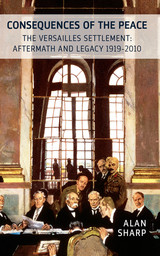
The Consequences of the Peace
The Versailles Settlement: Aftermath and Legacy 1919-2015
Alan Sharp
Haus Publishing, 2015
The Versailles Settlement, at the time of its creation a vital part of the Paris Peace Conference, suffers today from a poor reputation: despite its lofty aim to settle the world’s affairs at a stroke, it is widely considered to have paved the way for a second major global conflict within a generation. Woodrow Wilson’s controversial principle of self-determination amplified political complexities in the Balkans, and the war and its settlement bear significant responsibility for boundaries and related conflicts in today’s Middle East. After almost a century, the settlement still casts a long shadow.
This revised and updated edition of The Consequences of the Peace sets the ramifications of the Paris Peace treaties—for good or ill—within a long-term context. Alan Sharp presents new materials in order to argue that the responsibility for Europe’s continuing interwar instability cannot be wholly attributed to the peacemakers of 1919–23. Marking the centenary of World War I and the approaching centenary of the Peace Conference itself, this book is a clear and concise guide to the global legacy of the Versailles Settlement.
This revised and updated edition of The Consequences of the Peace sets the ramifications of the Paris Peace treaties—for good or ill—within a long-term context. Alan Sharp presents new materials in order to argue that the responsibility for Europe’s continuing interwar instability cannot be wholly attributed to the peacemakers of 1919–23. Marking the centenary of World War I and the approaching centenary of the Peace Conference itself, this book is a clear and concise guide to the global legacy of the Versailles Settlement.
[more]
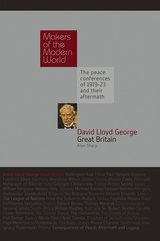
David Lloyd George
Great Britain
Alan Sharp
Haus Publishing, 2010
David Lloyd George (1863-1945). The end of the First World War saw Britain at the height of its power. Its fleet and air force were the largest in the world. Its armies had triumphed in the Middle East and spearheaded the final attacks in Western Europe that had driven the defeated Germans to seek an armistice. Britain now had to translate this military victory into the achievement of its war aims and future security and prosperity. Its main negotiator at the forthcoming peace conference would be its prime minister, the ebullient and enigmatic David Lloyd George, the "Welsh Wizard" and "the man who had won the war." Lloyd George's energy had maintained the war effort through the dark days of 1917 and early 1918, but now he anticipated, with relish, the prospect of winning the peace. Few were better equipped. He was a skilled and accomplished negotiator with the knack of reconciling the apparently irreconcilable. His admirers, of whom there were many, pointed to his brilliant and agile mind, his rapid grasp of complex questions and his powers of persuasion. His critics, who were also numerous, distrusted his sleight of hand, fleetness of foot and, frankly, his word. His six months in Paris in 1919, as he pitted his wits against formidable world leaders like Woodrow Wilson and Georges Clemenceau, were among the most enjoyable but exhausting of his life. This study investigates the extent to which Lloyd George succeeded in his aims and evaluates the immediate and longer-term results of his negotiations for Britain.
[more]
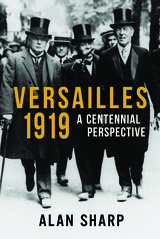
Versailles 1919
A Centennial Perspective
Alan Sharp
Haus Publishing, 2018
The Versailles Settlement, at the time of its creation a vital part of the Paris Peace Conference, suffers today from a poor reputation: despite its lofty aim to settle the world’s affairs at a stroke, it is widely considered to have paved the way for a second major global conflict within a generation. Woodrow Wilson’s controversial principle of self-determination amplified political complexities in the Balkans, and the war and its settlement bear significant responsibility for boundaries and related conflicts in today’s Middle East. After almost a century, the settlement still casts a long shadow.
Fully revised and updated for the centennial of the Conference, Versailles 1919 sets the ramifications of the Paris Peace treaties—for good or ill—within a long-term context. Alan Sharp mounts a powerful argument that the responsibility for Europe’s continuing interwar instability cannot be wholly attributed to the peacemakers of 1919–23. Concise and convincing, Versailles 1919 is a clear guide to the global legacy of the Versailles Settlement.
Fully revised and updated for the centennial of the Conference, Versailles 1919 sets the ramifications of the Paris Peace treaties—for good or ill—within a long-term context. Alan Sharp mounts a powerful argument that the responsibility for Europe’s continuing interwar instability cannot be wholly attributed to the peacemakers of 1919–23. Concise and convincing, Versailles 1919 is a clear guide to the global legacy of the Versailles Settlement.
[more]
READERS
Browse our collection.
PUBLISHERS
See BiblioVault's publisher services.
STUDENT SERVICES
Files for college accessibility offices.
UChicago Accessibility Resources
home | accessibility | search | about | contact us
BiblioVault ® 2001 - 2024
The University of Chicago Press



